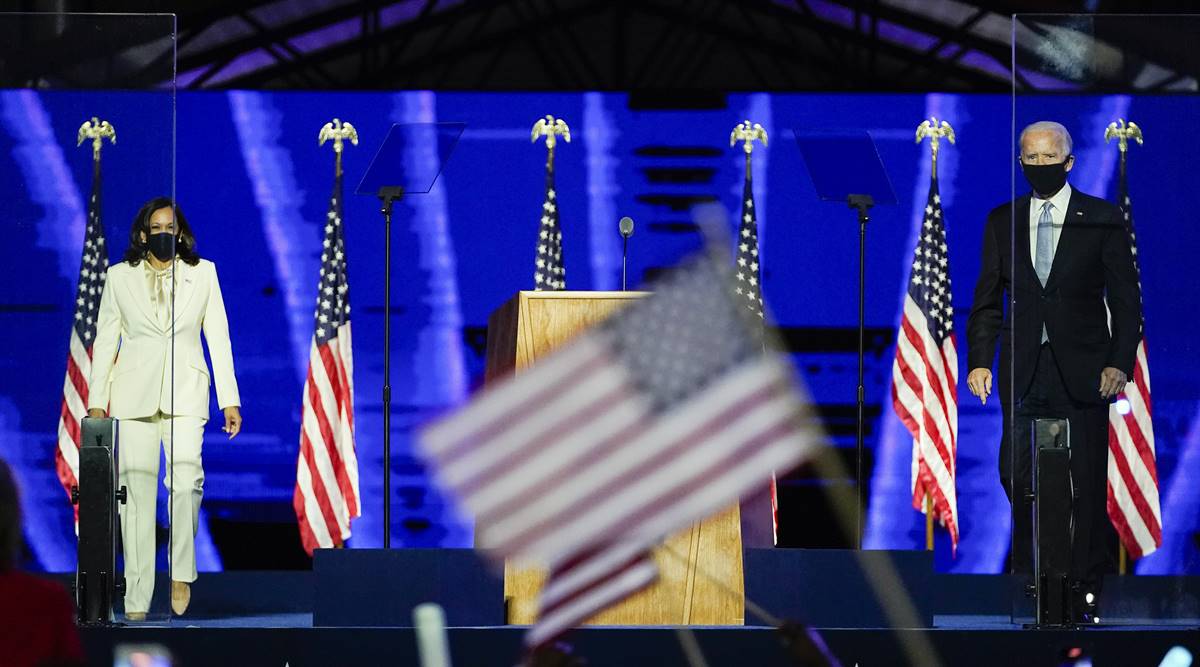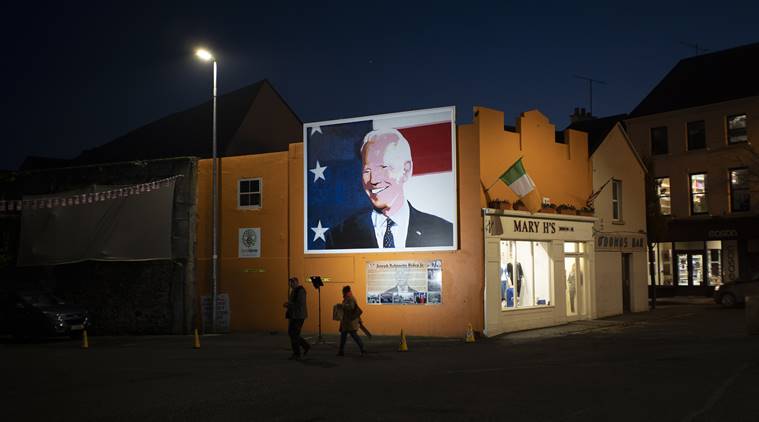 President-elect Joe Biden joins Vice President-elect Kamala Harris on stage Saturday, Nov. 7, 2020, in Wilmington, Del. (AP Photo/Andrew Harnik, Pool)
President-elect Joe Biden joins Vice President-elect Kamala Harris on stage Saturday, Nov. 7, 2020, in Wilmington, Del. (AP Photo/Andrew Harnik, Pool)Written by Mark Landler. Reporting was contributed by Steven Erlanger in Brussels, Aurelien Breeden and Liz Alderman in Paris, Melissa Eddy in Berlin, Ben Hubbard in Beirut, Lebanon, Isabel Kershner in Jerusalem, Carlotta Gall in Istanbul, Jeffrey Gettleman in New Delhi, Ivan Nechepurenko in Moscow, Vivian Wang in Hong Kong, Fatima Faizi and Najim Rahim in Kabul, Farnaz Fassini in New York, Catherine Porter in Toronto, and Anna Joyce in Dublin.
For a world that held its breath as Americans went to the polls last Tuesday, the triumph of Joe Biden over President Donald Trump provoked many emotions, but above all, a profound sigh of relief.
As news of Biden’s victory reverberated from Europe and the Middle East to Asia and Latin America on Saturday, foreign leaders showered him with congratulations. Diplomats and commentators expressed gratitude, satisfaction and even jubilation that a new president would bring a much-needed return to normalcy — something that vanished alarmingly the day Trump took office.
“Welcome back America!” the mayor of Paris, Anne Hidalgo, said in a Twitter message to Biden and Vice President-elect Kamala Harris.
Prime Minister Justin Trudeau, hailing Canada’s historic friendship with the United States, said, “I’m really looking forward to working together.” President Emmanuel Macron of France said, “We have a lot to do to overcome today’s challenges. Let’s work together!” Chancellor Angela Merkel of Germany declared, “Our trans-Atlantic friendship is irreplaceable, if we want to overcome the great challenges of our time.”
For many world leaders, the importance of this election was as much about removing Trump as ushering in Biden.
The former vice president is a familiar fixture on the global stage, a centrist Democrat who is likely to restore the traditional habits and methods of American power abroad. Trump, who held no office before the presidency, has been a great disrupter, leaving alliances in tatters and casting into doubt the liberal international order that the United States helped build after World War II.
“I feel optimistic for the first time in quite a long time,” said Simon Fraser, a former head of Britain’s Foreign Office. “I’m not expecting a radical change in American foreign policy, but I do expect a change in body language and tone, and a shift away from unilateralism to collaboration with allies.”
Nicola Sturgeon, the first minister of Scotland, did not wait for the race to be called, tweeting Friday evening, “The world can be a dark place at times just now — but today we are seeing a wee break in the clouds.”
Britain’s prime minister, Boris Johnson, whom Trump has treated as an ideological twin because of his populist tactics and championing of Brexit, issued a more restrained statement, but singled out Harris for her “historic achievement” as the first woman elected vice president.
“The U.S. is our most important ally,” he said, “and I look forward to working closely together on our shared priorities from climate change to trade and security.”
 A billboard of President-elect Joe Biden in Ballina, Ireland on Nov. 7, 2020. (Paulo Nunes dos Santos/The New York Times)
A billboard of President-elect Joe Biden in Ballina, Ireland on Nov. 7, 2020. (Paulo Nunes dos Santos/The New York Times)
For allies in Europe, the relief was palpable. Trump backed Brexit because he saw it as a way to undermine the European Union. He levied tariffs on European exports, pulled out of the Paris climate accord and hectored France and Germany about not paying enough to support NATO.
Even European leaders who tried to establish a rapport with Trump, like Macron, eventually gave up. Diplomats said these leaders hoped now to reset the trans-Atlantic relationship, particularly since Biden is expected to emphasize repairing frayed ties with Europe.
“You will be able to have a coherent conversation with a normal guy,” said Gérard Araud, a former French ambassador to Washington, who sat in on often discursive exchanges between Trump and Macron.
Araud said the arrival of Biden — a “nice guy, a smiling guy,” as he put it — would have emotional resonance for many Europeans, particularly older ones, who struggled to reconcile Trump’s unyielding “America First” vision with the generous, if imperfect, country they knew in the postwar period.
“They need to love America,” he said. “There is a sentimental relationship with America, which the Americans always underestimate.”
Few Europeans, however, believe that America will ever return to the intense global engagement that characterized it at the peak of its power. The deep divisions in American society and the close election suggested to some that the United States under a Biden presidency would remain inward-looking and preoccupied by domestic issues.
 People react to the Associated Press calling a victory for Joe Biden in the presidential election, Philadelphia, Nov. 7, 2020. (Ruth Fremson/The New York Times)
People react to the Associated Press calling a victory for Joe Biden in the presidential election, Philadelphia, Nov. 7, 2020. (Ruth Fremson/The New York Times)
Le Monde, one of France’s leading newspapers, said in an editorial this week that “Trumpism” was a “lasting heritage of American politics,” not an accident or brief “interlude.”
For countries that prospered under Trump, Biden’s victory drew more muted reactions.
Prime Minister Benjamin Netanyahu of Israel, a staunch ally of Trump who had a chilly relationship with his predecessor, Barack Obama, appeared to be waiting for official results before congratulating Biden.
There was no immediate reaction from Arab leaders like Crown Prince Mohammed bin Salman of Saudi Arabia, some of whom cultivated close ties with Trump.
Turkey’s strongman president, Recep Tayyip Erdogan, speaks with Trump about once a month — a relationship that has helped the country avoid sanctions and heavy fines. News organizations close to the Erdogan government have openly supported Trump and grew bitter at signs of his losing.
In Afghanistan, officials have been rooting for a Biden victory and the rollback of Trump’s policies, namely the gradual withdrawal of U.S. troops under a February peace agreement with the Taliban, signed in Qatar.
Iran, too, sought hope in a new beginning. Many Iranians rejoiced at the defeat of a president who devastated their economy with sanctions, escalated tensions to the brink of war and assassinated a top general.
“Trump and his followers are collapsing into history’s trash can while our Iran still stands,” said Ali Gholizadeh, a political analyst from Mashhad Tehran.
Not everybody welcomed the change.
In Hungary, where Prime Minister Viktor Orban has presided over what he has dubbed an “illiberal state,” the far-right Volner Party said it would rally in front of the U.S. Embassy in Budapest against “possible electoral fraud in the U.S. presidential election and in solidarity with President Donald Trump.”
Shortly after the American news media called the race for Biden, “Biden” became the top trending topic on Weibo, a Chinese Twitter-like platform.
 People celebrate in New York after Joe Biden was declared President-elect by the Associated Press, Nov. 7, 2020. (Tanner Curtis/The New York Times)
People celebrate in New York after Joe Biden was declared President-elect by the Associated Press, Nov. 7, 2020. (Tanner Curtis/The New York Times)
Hu Xijin, the editor of China’s nationalistic tabloid Global Times, said Trump had “yet to show a gesture of preparing to accept defeat,” adding that “American society is now highly divided, which creates the soil for further political derailment.”
But Hu’s outlet, Global Times, tweeted soon after that “Biden’s win could offer some ‘breathing room’ for China-US relations.’”